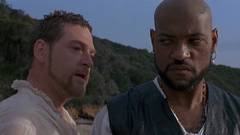After church tonight I went out with a bite with a few friends. We talked about pretty much every subject under the sun, so it was inevitable that someone would ask me, "Scott, what are your favourite science fiction movies?"
This is a really difficult question to answer, actually. What do you mean by "favourite"? Two of my guilty pleasures are Godzilla movies and the Star Trek series; I have a blast watching them. On the other hand, I get a completely different kind of thrill from watching a particularly intelligent, well crafted, or historically significant film, such as 2001: A Space Odyssey or Blade Runner. In fact, without question I would call both of those my favourite SF, even though on a wasted Sunday afternoon I'm more likely to pop The Wrath of Khan into the DVD player. Clearly, the question requires a bit of thought.
So here is my canonical list of personal favourite sci-fi flicks, by decade, along with a few brief comments:
1950s
For me, this is where the history of SF moviemaking starts. This is the decade in which science fiction on film really came into its own and began to be taken seriously as a genre. (Which is not to denigrate the accomplishments of previous years, such as Metropolis or King Kong.)
Best of the decade: The Day the Earth Stood Still (1951). Flying saucers land on earth, actually coming in peace for a change, but they scare everyone to death anyway. This Cold War allegory directed by Robert Wise remains quite watchable even today.
Runner-up: Forbidden Planet (1956). A science-fiction retooling of Shakespeare's The Tempest, relocated to the planet Altair IV and given some major Freudian overtones. This movie is notable for the on-screen debut of Robby the Robot, and for being one of the inspirations for Star Trek.
I would be remiss if I neglected to also mention the original Godzilla (1954), or the 1953 version of H. G. Wells' War of the Worlds.
1960s
Best of the decade: 2001: A Space Odyssey (1968). Bar none, Stanley Kubrick's masterpiece is the "quintessential good science-fiction movie": the most intelligent and groundbreaking one ever made, in fact.
Runner-up: Planet of the Apes (1968). A classic story about time travel to a world turned topsy-turvy, the final scene of this movie is one of the most memorable in film history.
1970s
Best of the decade: Alien (1979). Never mind the plot holes you can fly a space freighter through, this Ridley Scott blockbuster is not only one of the finest SF movies ever made, but it stands nearly at the top of the list of the greatest horror films as well.
Runner-up: Star Wars (1977). George Lucas' blockbuster space opera redefined sci-fi filmmaking. For many people this movie is the 70s. No doubt I'll catch all sorts of hell for daring to rank it second.
Other 70s films deserving honourable mention: Silent Running (1972), Close Encounters of the Third Kind (1977), and the first of the Star Trek films (1979).
1980s
Best of the decade: Blade Runner (1982). Another hit for Ridley Scott: the cerebral near-future dystopian film noir in which Harrison Ford plays a hard-boiled police officer whose job is to track down and "retire" (i.e. with extreme prejudice) escaped humanoid "replicants."
Runner-Up: The Terminator (1984). A murderous android from a future in which machines and men are at war travels to the present and relentlessly hunts down the mother of the leader of the humans before he is even born. This movie kick-started the careers of both James Cameron and Arnold Schwarzenegger.
Also worthy of mention in this decade: Star Trek II: The Wrath of Khan, generally considered the best of the Trek films. Khan's Genesis sequence, created by the division of Industrial Light & Magic that would later be spun off into CG giant Pixar, was the first use of CG animation in a motion picture. And speaking of George Lucas, the Star Wars sequels The Empire Strikes Back (1980) and Return of the Jedi (1983) are essential.
1990s
Best of the Decade: Contact (1997). Based on the bestselling novel by astronomer and SETI advocate Carl Sagan, the strong point of this intelligent and dramatic movie is less about contact with extra-terrestrial intelligence than the supposed tension between faith and evidence. Another personal favourite.
Runner-up:: The Matrix (1999). Neo-Platonism (no pun intended) meets kung fu in this surprise hit. The Matrix is also notable for its special effects, particularly the 3D freeze-frames and "bullet time" sequences. It also proves Keanu Reeves can act if he keeps his mouth shut most of the time.
The 1990s also brought us the quirky French movie The Fifth Element (1997) and Paul Voerhoven's ultra-violent Schwarzenegger vehicle Total Recall (1990). Arnold subsequently appeared in Terminator 2: Judgment Day (1991), which introduced computer-generated, photorealistic "morphing" effects to the moviegoing public.
2000 and beyond
Obviously, with the current decade not yet half over, it's too soon to call it. And frankly it hasn't been a fantastic era for science fiction, yet. But so far, my money is on Minority Report, Stephen Spielberg's treatment of the Philip K. Dick story. My prediction: This fall's Sky Captain and the World of Tomorrow was a commercial and critical success; its director, Kerry Conran, plans to follow it up with Edgar Rice Burrough's A Princess of Mars in 2006. Meanwhile, there are also remakes of King Kong and War of the Worlds on the horizon, which could well make this the decade of "retro SF." Also anticipated: the long-awaited big-screen treatment of The Hitch-hiker's Guide to the Galaxy (now in post-production) and the last of the Star Wars movies, Revenge of the Sith. So far, it's looking up to be a so-so decade for filmed SF.
Anyway, these are just my opinions. Feel free to disagree, or try to justify alternatives, if you like.

 Or are they distinct? In actual fact, they mesh perfectly, leading one to think that perhaps they're the same frickin' song. Same tempo. Same beat. Same chords. Same long pause in the middle.
Or are they distinct? In actual fact, they mesh perfectly, leading one to think that perhaps they're the same frickin' song. Same tempo. Same beat. Same chords. Same long pause in the middle.

 In
In 
 By "others," Martin of course means himself. Heretofore he has shown no apparent discomfort at her demeaning and disrespecting the American people and their leadership and almost singlehandedly setting Canada-U.S. relations back a decade. But now that it's personal. . . .
By "others," Martin of course means himself. Heretofore he has shown no apparent discomfort at her demeaning and disrespecting the American people and their leadership and almost singlehandedly setting Canada-U.S. relations back a decade. But now that it's personal. . . .

 This evening I walked past the War Memorial and was glad to see that it had not yet been cleaned up. All the wreaths laid at the base of the cenotaph were still there (veterans on the west side, diplomats on the east), as were the hundreds of poppies on the Tomb of the Unknown Soldier. It has only been four years since he was interred at the base of the cenotaph, but it has already become traditional for onlookers to take the
This evening I walked past the War Memorial and was glad to see that it had not yet been cleaned up. All the wreaths laid at the base of the cenotaph were still there (veterans on the west side, diplomats on the east), as were the hundreds of poppies on the Tomb of the Unknown Soldier. It has only been four years since he was interred at the base of the cenotaph, but it has already become traditional for onlookers to take the  plastic poppies from their lapels and leave them on the sarcophagus.
plastic poppies from their lapels and leave them on the sarcophagus.





